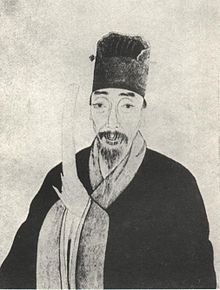Liu Zongzhou
Appearance

Liu Zongzhou (simplified Chinese: 刘宗周; traditional Chinese: 劉宗周; pinyin: Liú Zōngzhōu, 1578–1645), also known as Liu Jishan (simplified Chinese: 刘蕺山; traditional Chinese: 劉蕺山), was a Confucian scholar from the Ming dynasty, born in Shanyin, Shaoxing. He is considered the last master of Song-Ming Neo-Confucianism and is known for his criticism of the teachings of Wang Yangming.[1] Grieved at the fall of the Ming dynasty to Qing dynasty, Liu Zongzhou died on 8 June of the self-imposed starvation at age 68.[2] Along with Hu Hong, Liu Zongzhou's thoughts are regarded as part of a third stream of Neo-Confucianism by Mou Zongsan.
References
- ^ Pan, Jen-tai (April 2010). "Liu Zongzhou's Criticism of Wang Yangming's Followers and his Scheme for Moral Reformation". Ming Studies. 61: 13–55. doi:10.1179/014703710x12772211565909.
- ^ "Liu Zongzhou". Shaoxing Government.
